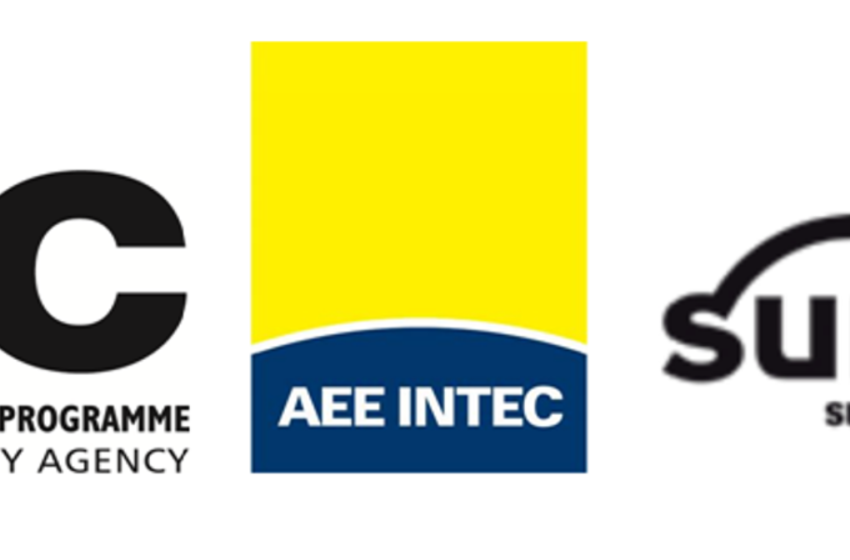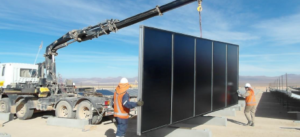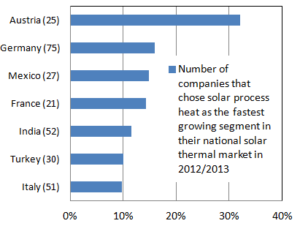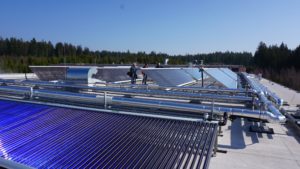France: New ESCO Focuses on Process Heat
May 2, 2015
A start-up company will host the next Task 49 meeting in Montpellier, France. This is unusual for the IEA Solar Heating and Cooling Programme, but the business target of French company Sunti is a perfect fit for Task 49, which aims at increasing solar heat integration into industrial processes. Sunti was founded in November 2014 by Jean-Michel Germa, a pioneer of the renewable industry who owns a 40 % stake in French La Compagnie du Vent. The new business wants to sell process heat to firms in France and the Mediterranean region as an Energy Service Company (ESCO).
On the day before the Task 49 meeting, Sunti will invite end consumers and industry consultants to yet another event: SHIP 2015 will feature international experts and industrial players with great knowledge and experience in solar heat and industrial processes. For example, Bettina Muster from AEE Intec and Cédric Philibert from the IEA will talk about how to integrate solar heat into industrial processes, whereas representatives from Arcon-Sunmark, S.O.L.I.D., TVP Solar and Industrial Solar will talk about their experiences with commercial projects.
Production companies should focus on core business rather than invest in energy plants
Of course, hosting the event is a big opportunity for Sunti: “We are part of the business now,” Kevin Mozas, Head of Business Development, said in an interview with http://www.solarthermalworld.org. According to him, the start-up is targeting big plants with collector sizes of 1,000 m2 or more. A key argument for companies to pay a fee for heat instead of investing in their own equipment is the long-term nature of solar thermal investments. “Companies expect their investments to pay off within the first three years. Solar thermal investments are very unlikely to have such a short payback period,” Mozas explains.
Instead of raising money to set up their own collector field, clients will only have to sign a contract which will bind them for up to ten years. Even if they could install their own collector field, they might prefer to leave planning, investing and operating to an ESCO. Mozas believes that manufacturing companies should be allowed to focus on their core business and rather invest in new production lines than in energy generation. There are things that might dampen optimism, however. “Customers are reluctant to the idea of employing solar heat, they sometimes have negative opinions because of a lack of information,” Mozas explains. Some companies just do not consider energy supply to be a priority.
Sunti is an independent company entirely owned by its founder Jean-Michel Germa and employs a staff of eight. It expects the first projects to be realised before the end of 2015, with investments being done through equity and debt finance.
ESCOs could help raise solar thermal popularity
Experts on solar process heat like Christoph Brunner, Head of the Industrial Processes and Energy Systems Department at Austrian AEE Intec, believes that ESCOs could help make solar thermal energy more popular as a source of process heat. “By leaving investments to a provider, companies can transfer part of the risk to a third party,” he points out.
As Sunti shoulders the long-term investment risks, clients will not have to worry about any return on investment or payback ratio, but instead can focus on the benefits of solar thermal energy supplied by the ESCO. They will reduce a company´s energy bill immediately after the solar thermal field has come into operation. The fact that subsidies for solar thermal projects from French programme Fonds Chaleur may pay half of the entire investment might help promote Sunti’s ideas.
First step: Optimise energy use in companies
Of course, Mozas adds that solar heating may not be the right solution for every industrial plant: “First of all, it is a question of having enough space to allow the installation of big collector fields. The type of process, the heat demand curve, as well as process temperatures are certainly very important when it comes to evaluating the feasibility of a project.” Part of the service which Sunti offers is the financing of initial studies. Before planning an installation of any kind, the first step will always be to determine what a company can do to optimise energy use and how large the solar heat potential is. Systems covering the entire process heat demand of a company will be the exception rather than the rule, but solar heat coverage above 50 % is feasible. “We are trying to determine the economic optimum,” Mozas says.
When such a process leads to a feasible collector field installation, Sunti will act as the energy provider which will ultimately own the solar plant and sell heat to clients that only have to sign the contract and provide space for the solar field. The ESCO is partnering with experienced technology providers and large-plant EPC (Engineering, Procurement and Construction) contractors to set up solar thermal plants. The risks are with Sunti, which will be responsible for the technical project specifications and will finance and operate the solar plant. After the contract ends, clients might choose to buy their installation at residual value and maintain it on their own instead of paying fees to the ESCO. “But each contract will be negotiated individually,” Mozas emphasises. By the end of a contract period, the client will already have benefited from low energy costs for several years and will be more willing to trust that “his” installation can operate much longer.
More information:
This news was written by Vanessa Kriele, a German freelance journalist specialised in renewable energies and world economics.


